03.09.2019 | edited by: Beate Kittl | News WSL
The EU has approved two projects totaling 14 million Euros for The integrated European Long-Term Ecosystem, critical zone and socio-ecological systems Research Infrastructure (eLTER). This is opening another important chapter in the development of a permanent infrastructure for long-term ecosystem, critical zone and socio-ecological research in Europe. Switzerland contributes with its expertise, data and infrastructure from 19 Long-Term Forest Ecosystem Research plots.
This funding will enable significant development of the eLTER Research Infrastructure for long-term ecosystem, critical zone and socio-ecological research in Europe. It will also give a major boost to scientific work done at eLTER sites and platforms. Altogether, 34 partners from 24 countries will be involved in two projects.
The consortium aims to further the operational, technical and strategic development at the existing sites in Europe to meet the current challenges of global change with holistic, systemic observations and analysis of environmental trends. Harmonized methods and research approaches will be applied, access to data will be facilitated and a wide range of user groups, from research to policy, will receive comprehensive support. In parallel, performance tests of the emerging eLTER RI will be conducted. Selected sites and platforms in terrestrial, freshwater and coastal ecosystems will be used to study ecosystem integrity, impacts of climate change, and endangered ecosystem services at pan-European scale.
Swiss contribution
In Switzerland, WSL has been conducting Long-Term Forest Ecosystem Research (LWF) on 19 permanent observation plots, starting in 1994. Some of these long-term monitoring plots are also part of international networks such as ICP Forests , eLTER, TreeNet, ICOS and Swiss FluxNet. In the newly funded EU project, WSL will use existing synergies and contribute with its expertise, applied methods and infrastructure. It has been allocated 500,000 Swiss Francs for 5 years. The Swiss project leader is the WSL ecophysiologist Marcus Schaub.
Why eLTER RI?
eLTER RI responds to the need for knowledge in a particularly sensitive area: In a world that is subject to rapid global changes such as climate change and land-use change, multiple factors simultaneously affect ecosystems. This happens in complex spatial and temporal patterns and is often associated with significant losses of biodiversity and ecosystem services. While such effects are well studied in the short term, little is known about long-term effects on the system as a whole, or about overarching relationships and feedbacks between climate, water balance, plants or animals.
Read entire news release by the Helmholtz-Centre for Environmental Research (UFZ)
Contact for Switzerland ¶
Link ¶
Copyright ¶
WSL and SLF provide the artwork for imaging of press articles relating to this media release for free. Transferring and saving the images in image databases and saving of images by third parties is not allowed.


